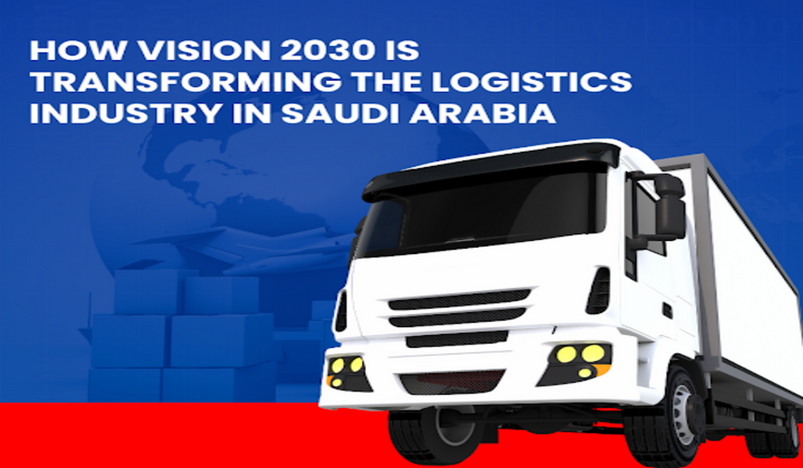
Logistics Industry in Saudi Arabia
Saudi Arabia's Vision 2030 is an ambitious blueprint for the future, aiming to diversify the economy and reduce the country’s dependence on oil. One of the key sectors targeted for transformation under this vision is logistics and freight forwarding. By leveraging its strategic geographic location, investing in infrastructure, and adopting modern technologies, Saudi Arabia is positioning itself as a global logistics hub. Let’s dive into how Vision 2030 is reshaping the logistics industry in the Kingdom.
Saudi Arabia's location is a significant advantage for the Fast n Accurate logistics industry. Positioned at the crossroads of Europe, Asia, and Africa, the country is ideally situated to become a central logistics hub. Vision 2030 aims to capitalize on this by developing infrastructure that facilitates efficient movement of goods across these regions.
The Red Sea coastline, home to major ports like Jeddah Islamic Port and King Abdullah Port, is being expanded and modernized. These ports are crucial for maritime freight forwarding, serving as key entry and exit points for goods. Enhancements in port infrastructure and management are expected to significantly reduce turnaround times and boost capacity, making Saudi ports more competitive on the global stage.
Infrastructure is the backbone of the logistics industry, and Vision 2030 emphasizes heavy investment in this area. The development of new transport networks, including roads, railways, and airports, is underway to ensure seamless connectivity across the Kingdom and beyond.
One of the standout projects is the Saudi Landbridge, a railway project linking the Red Sea to the Arabian Gulf. This will provide a faster, more efficient route for transporting goods across the country, reducing the reliance on maritime routes and cutting down transit times. Additionally, the expansion of King Abdulaziz International Airport and the construction of the new Riyadh metro are set to improve urban logistics, facilitating the quick movement of goods within major cities.
Vision 2030 recognizes the importance of technology in revolutionizing logistics. The adoption of advanced technologies such as blockchain, artificial intelligence (AI), and the Internet of Things (IoT) is transforming the way freight forwarding and logistics are managed.
Blockchain technology is being implemented to enhance transparency and efficiency in logistics operations. By creating a decentralized ledger of transactions, blockchain ensures that all parties involved in the supply chain have access to real-time, tamper-proof information. This reduces the risk of fraud, improves traceability, and streamlines the documentation process, making freight forwarding more efficient.
Artificial intelligence and IoT are playing a pivotal role in creating smart logistics solutions. AI algorithms are being used to optimize route planning, predict demand, and manage inventory more effectively. IoT devices, such as smart sensors, provide real-time data on the condition and location of goods, enabling better monitoring and control throughout the supply chain. These technologies help reduce costs, improve delivery times, and enhance customer satisfaction.
By transforming the logistics sector, Vision 2030 aims to diversify Saudi Arabia’s economy and create new job opportunities. The growth of the logistics industry is expected to generate a wide range of employment opportunities, from manual labor to highly skilled technical and managerial roles.
The development of logistics hubs and free zones, such as the King Salman Energy Park (SPARK) and the Jazan Economic City, is attracting both local and international companies. These zones offer incentives like tax breaks and simplified regulatory procedures, making it easier for businesses to set up operations and contribute to the local economy. This influx of businesses and investments is driving job creation and skill development, further boosting the sector's growth.
Vision 2030 is not just about improving domestic logistics; it also aims to enhance trade and regional integration. By developing robust logistics infrastructure, Saudi Arabia seeks to strengthen its trade relationships with neighboring countries and beyond.
The Kingdom is actively participating in initiatives like the Gulf Cooperation Council (GCC) railway project, which aims to connect all GCC countries through a comprehensive railway network. This will facilitate smoother and more efficient trade across the region, promoting economic cooperation and growth.
Sustainability is a core component of Vision 2030. The logistics industry is being encouraged to adopt eco-friendly practices to reduce its environmental impact. This includes the use of electric vehicles for transportation, investing in renewable energy sources, and implementing green building standards in warehouses and logistics centers.
The government is also promoting the use of smart logistics solutions to minimize waste and improve energy efficiency. By embracing sustainable practices, Saudi Arabia is not only contributing to global environmental efforts but also positioning itself as a leader in green logistics.
Vision 2030 is a game-changer for the logistics industry in Saudi Arabia. Through strategic investments in infrastructure, the adoption of cutting-edge technologies, and a focus on sustainability, the Kingdom is transforming itself into a global logistics powerhouse. These efforts are not only boosting the economy but also creating new job opportunities and enhancing trade relations. As Vision 2030 continues to unfold, the future of freight forwarding and logistics in Saudi Arabia looks incredibly promising.
.jpg)
Qatar Secures Place Among the World's Top 10 Wealthiest Nations
.jpg)
Hamad International Airport Witnesses Record Increase in Passenger Traffic

Saudi Arabia: Any visa holder can now perform Umrah

What are Qatar's Labour Laws on Annual Leave?
Leave a comment